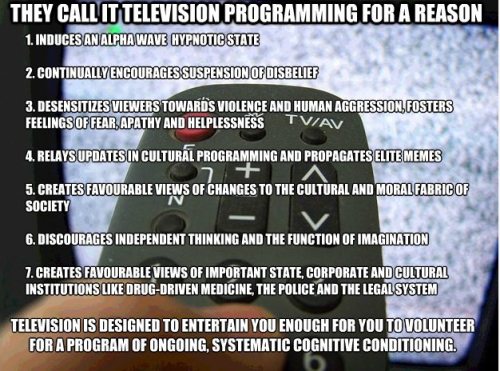Tom Sweetnam
Platinum Member
"Television" and "trash" are inseparable. It's the nature of the medium. A two dimensional box that tells you to "sit down, shut up, and now I'm going to fill your mind with impressions I dictate". This is to make your mind jello so it's nice and vulnerable to watch a commercial to sell you Jello. Trash has always been an integral part of TV and always will be. It's incapable of honesty or deep thought or anything subtle. It's capable of sensual imagery and completely superficial emotionally-based bullshit, and that's it.
Walk into a room where people are watching TV sometime and instead of joining them looking at the screen, watch the watchers. Notice what you see: hypnotized drones sitting back, passive sponges, obediently ingesting whatever the box tells them. Knowing that, the producers of the content will contrive the cheapest, least informative, most emotional bullshit htey can hook you with, because the whole purpose of TV is a propaganda tool to sell you commercials, which in turn are propanganda to incite you to go out and buy shit you don't need (nobody has to tell you what you do need).

The description "vast wasteland" was coined in 1961. It's the nature of the beast. It needs to go yesterday.
You've pretty much just echoed Ray Bradbury's sentiments regarding his thematic intention with the novel Fahrenheit 451. When he was awarded his Pulitzer Prize from Columbia University in 2007, for some strange reason, Columbia wouldn't allow him to address the audience at the ceremony. Probably because Bradbury scoffed at the left's idea of Fahrenheit 451 being a portent of fascist totalitarianism.
"It wasn't", he told a Ventura, California 50th anniversary Fahrenheit 451 reissue book-signing party...where I was in attendance. He told the audience that his intention with the novel was to target the monster called television; the lengths to which humanity's most insidious propaganda organ would go, to ensure that the big screen on the wall was the only source of visceral stimulation for all the gelatinous proles hooked on its aura.
That's what the book burning was all about -television's attempt at absolute control of propaganda dissemination. Biting the hand that fed him? Maybe. But the man wrote more than 500 novels, short stories, screenplays, and television scripts in his long career. He had very little regard for what television had become.
Lefties in the audience were gobsmacked. But let's not get too condescending here. How many of us go through the absolute heebie-jeebies when our ISP is down, when our umbilical connection to the web is cut? Talk about withdrawal.
Well now you've piqued my curiousity. I've never seen the book or read the movie.
Our internet dependence cuts deep, point well taken, but I don't quite see them as similar -- on the internet you're still in control and with enough content can go fetch any kind of info you want -- far more unlimited. I really don't find myself melting down at those times, I just make the call to the ISP and then figure, "time to play some music" or something else creative.
The perils of TV, besides sitting you down like a sponge and dictating your senses, is that that shuts off the imagination. That's why radio will always be a superior medium. Watch a movie on TV and all the tiniest details are scripted by somebody else and spoon-fed. Listen to the same piece as a radio drama and your own imagination engages to create what this character looks like, what the room looks like, what the action looks like-- infinitely more creative on both ends. Good mental exercise. Physical too because you're not pinned to one spot -- you can walk around and do other things besides become an indolent wart on the barcalounger.
Not nice to shut off the imagination.
I wonder if you are this contemptuous of stage acting?
I'm not contemptuous of anything here. Simply stating the obvious. I like theater. We have a tiny one over in Creede that sometimes produces plays by local writers.







